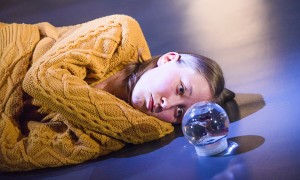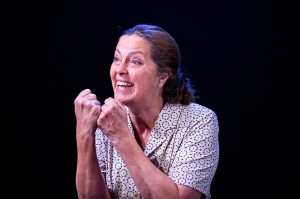 This review first appeared on the Sheengate publishing website. The production, by Headlong Theatre, was at Richmond Theatre from 3-7 November 2015.
This review first appeared on the Sheengate publishing website. The production, by Headlong Theatre, was at Richmond Theatre from 3-7 November 2015.
The Glass Menagerie at Richmond Theatre is an impressive and moving production of Tennessee William’s “memory play”, with strong performances from the entire cast.
According to Tom Wingfield, one of the protagonists, the play is “truth in the pleasant disguise of illusion”, a memory of events that happened several years before, when he was living at home with his overbearing mother Amanda and his disabled and painfully shy sister Laura.
The staging is one room, set back on the stage to emphasise its distance from both the audience and the present. As Tom says in his introduction, as a memory play it is “dimly lighted… not realistic” and we see a stage stripped of nearly all furniture and props, with no windows and no homely touches. The actors are barefoot and, although the play is set in 1937, their hair and costumes belong to no particular period, as if to show that that such details are unimportant and distracting, and that it is only the interaction of the characters that is significant.
 All of the Wingfields are trapped – Tom in a boring job in a warehouse and by his mother’s constant talking and nagging, Laura by her inability to cope with the world outside the home and Amanda by the disappointment in how her life has turned out. Tom escapes to the unreality of the movies each night, Amanda to memories of her youth and Laura to her collection of glass animals – the ‘glass menagerie’ of the title.
All of the Wingfields are trapped – Tom in a boring job in a warehouse and by his mother’s constant talking and nagging, Laura by her inability to cope with the world outside the home and Amanda by the disappointment in how her life has turned out. Tom escapes to the unreality of the movies each night, Amanda to memories of her youth and Laura to her collection of glass animals – the ‘glass menagerie’ of the title.
Pressured by Amanda, who wants a ‘gentleman caller’ for Laura, Tom invites a workmate, Jim O’Connor, round for dinner. Jim, Tom and Laura had also been at high school together where Jim had been the most popular boy in school, a sportsman and a performer, and the boy on whom Laura had a powerful crush.
In the most moving scene of the play, Jim and Laura connect and he brings her out of her shyness. They dance and kiss, but then Jim reveals that he is already engaged, dashing Amanda’s overblown and unrealistic hopes for her daughter’s future. Angrily she turns on Tom, who leaves home soon afterwards, abandoning his mother and sister to pursue his own dreams of ‘adventure’, but always unable to lose the sense that he has let Laura down.
Headlong Theatre’s production has excellent performances from all four leads: Greta Scacchi, as the constantly talking and fussing Amanda, is middle-aged and dowdy in a drab housecoat, but with eyes and body that come alive when she recalls her youth; Tom Mothersdale as Tom moves between being part of the action and reflecting on it; Eric Kofi Abrefa charms as Jim, disappointed with how his earlier promise has faded, while conveying his optimism about his future; and Erin Doherty, fragile and hesitant as Laura, who comes alive when she talks to Jim.
Given the number of school students in the audience, The Glass Menagerie is on this year’s GCSE syllabus, but this production deserves to be seen beyond those who are studying the play. The strong and nuanced performances, and the fine direction make this a compelling and moving evening at the theatre.

